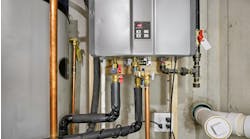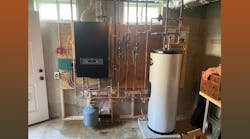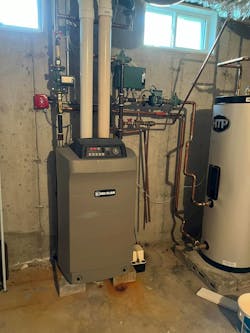Some homeowners do not understand the advantages of timely and proper servicing of residential boilers and water heaters. A few projects, however, perfectly demonstrate the benefits.
A Massachusetts homeowner discovered the lesson when Mark Storrs replaced a 10-year-old high efficiency boiler in a 2,480-square foot home in Wareham. The boiler for the three-bedroom, three-bath home was about 10 years old. Most times, a boiler will last a minimum of 15 years—with proper servicing.
The lack of servicing for this unit, however, significantly reduced the unit’s lifespan. “Sometimes it’s related to water quality, but that wasn’t the case for this home,’’ said Storrs, the proprietor of Mark Storrs Plumbing & Heating. “The boiler was leaking from top to bottom from sediment buildup. It was high efficiency, but it wasn’t well-hung and was not properly serviced.”
Storrs replaced the unit with an HTP Elite Fire Tube Ultra Boiler which resists combustion chamber damage, scale build-up and magnetite formation better than most other heat exchanger types.
Assessing the Issue
With more than two decades of experience in the industry and the Massachusetts market, Storrs knows when issues are related to water quality or lack of maintenance. He determined early on this home’s issues was a direct result of the latter.
“Wareham doesn’t have issues like that,’’ Storrs said. “There are some communities where you just know it’s related to water quality.”
The hardness of water—a high content of calcium and magnesium—has a detrimental impact on heating equipment. Issues arise when these elements form into solids when water is heated. Scale and sediment can collect inside the heating system and harm the equipment.
On a hydronic system, mineral scale from hard water can impact more than the heating unit. Buildup also reduces energy efficiency and reliability.
Storrs, however, knew this home’s problems stemmed from lack of maintenance. “I see it all the time,’’ he said. “It’s automatic, you have to have it serviced every year. That is just part of the deal. You don’t have to have annual maintenance on the equipment but just realize that it’s going to create problems.”
Even with good water quality, heating equipment still needs annual maintenance to improve system longevity. “It only takes about an hour,’’ said Storrs, who charges less than $300 for the service. “I’ll pump the descaler through and let it run in a continuous circle for about 45 minutes. You can see that the descaler goes in clear and comes out gray. That’s how you know there has been some buildup in there.”
Fire Tube Exchanger
Storrs selected the HTP unit on a recommendation. He had used other brands but found the HTP unit easier to install and preferred the set up for the condensation discharge.
The Fire Tube Heat Exchanger is constructed of robust chromium stainless steel and resists combustion chamber damage, scale build-up and magnetite formation better than similar products on the market. The design prolongs the lifetime of the unit and reduces the need for maintenance.
The unit also offers high efficiency, low pressure drop and dependable performance. The 10:1 turndown ratio limits short cycling for more efficient energy consumption and includes a highly efficient ECM pump.
“I had been using a model from another manufacturer,’’ Storrs said. “I’m going to stick with these. I liked the way the condensate discharge was set up, and I thought it looked better. The way they have everything set up on the bottom—the inlet, the outlet, the supply return—it wasn’t tight. I also liked the outdoor sensor that tells the boiler what the temperature is outside. When it’s 450-50 degrees, it will only send out 120-degree water so it’s not working so hard. On colder days it sends hotter water. That’s a nice feature.”
Common Problem
It’s not uncommon for homeowners to delay maintenance on their heating systems. With all of the expenses associated with home ownership and basic life necessities, it’s easy to skip maintenance on home heating equipment. But similar to an automobile engine, proper and timely maintenance by licensed professionals saves money—and aggravation—in the long haul.
“Heating equipment is expensive, and proper maintenance can keep the system running far longer,’’ Storrs said. “It’s important to take care of minor problems before they turn into big problems. The last thing you want to have happen is for the system to break down in the middle of winter because it wasn’t serviced.”
Thomas Renner writes on building, construction and other trade industry topics for publications throughout the United States.



